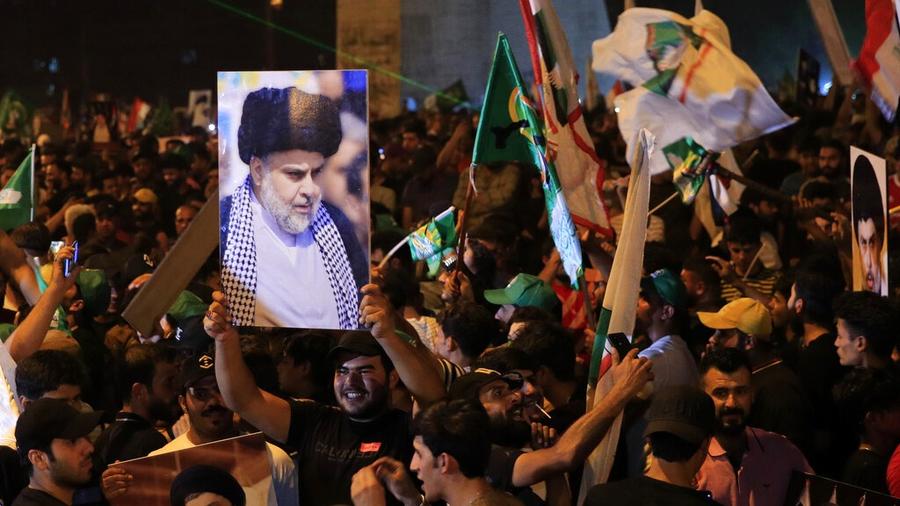 Followers of Shiite Muslim cleric Muqtada al-Sadr celebrate holding his posters, after the announcement of the results of the parliamentary elections in Tahrir Square, Baghdad, Iraq, Oct 11, 2021. (Hadi Mizban /ap)
Followers of Shiite Muslim cleric Muqtada al-Sadr celebrate holding his posters, after the announcement of the results of the parliamentary elections in Tahrir Square, Baghdad, Iraq, Oct 11, 2021. (Hadi Mizban /ap)
After a low voter turnout in Iraq’s parliamentary elections, the incoming leaders should focus on building on the gains achieved by the past government to alleviate the sufferings of Iraqis, analysts said.
The elections, held on Oct 10 with a turnout of 41 percent and initially scheduled for 2022, were a response to protests in October 2019 denouncing corruption and poor governance. More than 25 million people were eligible to vote.
During the polls, 3,249 candidates competed individually and within 167 parties and coalitions to win 329 seats in the upcoming Parliament.
Chinese Foreign Ministry spokesman Zhao Lijian said on Oct 12 that China welcomed the smooth electoral process. It hopes Iraqi factions will take this opportunity to further strengthen solidarity and advance domestic political agenda, he said, adding China also wishes that Iraq achieves enduring peace and stability as well as prosperity and development.
Shiite Muslim cleric Muqtada al-Sadr’s bloc, the Sadrist Movement, won nearly 70 seats in Baghdad and other southern provinces, while the State of Law Coalition, headed by former prime minister Nuri al-Maliki, secured 35 seats, according to the official announcement.
Initial results also showed the al-Fateh Coalition (Conquest), which includes some Shiite militias of Hashd al-Shaabi, garnered about 14 seats. The Imtidad Movement, whose members joined the 2019 protests, won about nine seats, mainly in the southern province of Dhi Qar.
Taqaddum, or Progress, headed by outgoing Parliament Speaker Mohammed al-Halbousi, won 40 seats in Baghdad and other Sunni provinces. The Kurdistan Democratic Party, headed by the Kurdish leader Masoud Barzani, won most seats of the Kurdish parties with about 32 seats, mainly in Erbil and Duhok.
Hassan Abdilah, director at nongovernmental youth organization JSSOR in Dhi Qar, said the results were “not expected and wanted by the Iraqi youth”.
His organization hopes the next government can create more jobs for the youth, especially with new graduates joining the labor force, and work on the country’s education system. “Above all, fighting corruption because with corruption, nothing from the above demands can be achieved,” Abdilah said.
Abdilah lauded Iraq’s Independent High Electoral Commission for doing “great work”, and the United Nations, NGOs, and the government, which “invested much power and deployed tens of thousands of troops” and other election observers, in facilitating smooth elections.
“There are many firsts in these elections. First of all, this is the first time when early elections are taking place given the protesters’ demand in 2019. Secondly, there is a new reformed electoral law in place, which divides the country in many smaller constituencies which has resulted in an increase in the number of constituencies from 18 to 83,” said Manjari Singh, an associate fellow at the Centre for Land Warfare Studies in New Delhi.
Amjed Rasheed, senior researcher at Iraqi nonprofit Open Think Tank, said whoever leads next should sustain outgoing Prime Minister Mustafa al-Kadhimi’s progress in depoliticizing the judiciary and support his anti-corruption policies.
Rasheed said vital steps have not been taken to achieve genuine decentralization, such as having a second chamber beside the Council of Representatives, resolving oil-related issues, the Kurdish forces’ salaries and solving the disputed areas between the Kurdish region and the center.
“Supporting decentralization will decrease ISIS (Islamic State of Iraq and Syria) threats, which (are) capitalizing on the Shia-dominated government and its sectarian policies against the Sunnis … ease the governmental processes, and achieve a fair share of the budget,” Rasheed said.
Singh said being able to play a mediation role has been the biggest achievement by the Kadhimi government, citing the balance of US and Iranian interests in his country and for being able “to bring Saudis and Iranians on the same table”.
Zhao Jia in Beijing contributed to this story.


